
The Global System for Mobile Communications (GSM) is a standard developed by the European Telecommunications Standards Institute (ETSI) to describe the protocols for second-generation (2G) digital cellular networks used by mobile devices such as mobile phones and tablets. It was first deployed in Finland in December 1991. By the mid-2010s, it became a global standard for mobile communications achieving over 90% market share, and operating in over 193 countries and territories.
A generation gap or generational gap is a difference of opinions between one generation and another regarding beliefs, politics, or values. In today's usage, generation gap often refers to a perceived gap between younger people and their parents or grandparents.
A ringtone or ring tone is the sound made by a telephone to indicate an incoming call or text message. Not literally a tone nor an actual (bell-like) ring anymore, the term is most often used today to refer to customizable sounds used on mobile phones.
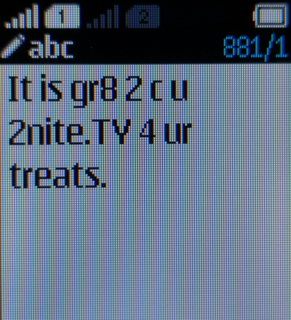
Text messaging, or texting, is the act of composing and sending electronic messages, typically consisting of alphabetic and numeric characters, between two or more users of mobile devices, desktops/laptops, or another type of compatible computer. Text messages may be sent over a cellular network, or may also be sent via an Internet connection.

Mobile telephony is the provision of telephone services to phones which may move around freely rather than stay fixed in one location. Telephony is supposed to specifically point to a voice-only service or connection, though sometimes the line may blur.
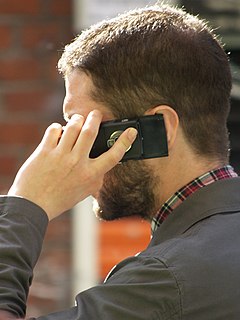
The antennas contained in mobile phones, including smartphones, emit radiofrequency (RF) radiation ; the parts of the head or body nearest to the antenna can absorb this energy and convert it to heat. Since at least the 1990s, scientists have researched whether the now-ubiquitous radiation associated with mobile phone antennas or cell phone towers is affecting human health. Mobile phone networks use various bands of RF frequency, some of which overlap with the microwave range. Other digital wireless systems, such as data communication networks, produce similar radiation.
A helicopter parent is a parent who pays extremely close attention to a child's or children's experiences and problems, particularly at educational institutions. Helicopter parents are so named because, like helicopters, they "hover overhead", overseeing every aspect of their child's life constantly. A helicopter parent is also known to strictly supervise their children in all aspects of their lives, including in social interactions.
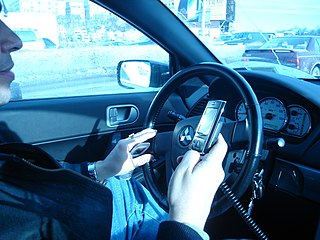
Mobile phone use while driving is common but it is widely considered dangerous due to its potential for causing distracted driving and crashes. Due to the number of crashes that are related to conducting calls on a phone and texting while driving, some jurisdictions have made the use of calling on a phone while driving illegal. Many jurisdictions have enacted laws to ban handheld mobile phone use. Nevertheless, many jurisdictions allow use of a hands-free device. Driving while using a hands-free device is not safer than using a handheld phone to conduct calls, as concluded by case-crossover studies, epidemiological, simulation, and meta-analysis. In some cases restrictions are directed only at minors, those who are newly qualified license holders, or to drivers in school zones. In addition to voice calling, activities such as texting while driving, web browsing, playing video games, or phone use in general can also increase the risk of a crash.

Ian David Karslake Watkins is a Welsh convicted sex offender and former singer, songwriter, and musician. He achieved prominence as the co-founder, lead vocalist, and lyricist of the rock band Lostprophets. In 2013, he was sentenced to 29 years of imprisonment for multiple sexual offences, including the sexual assault of young children and babies. Lostprophets disbanded shortly thereafter and the other members formed the band No Devotion, with American singer Geoff Rickly replacing Watkins.
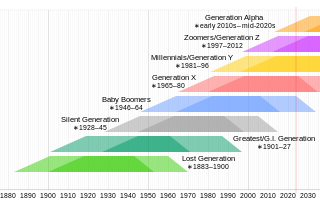
Generation Z, colloquially also known as zoomers, is the demographic cohort succeeding Millennials and preceding Generation Alpha. Researchers and popular media use the mid-to-late 1990s as starting birth years and the early 2010s as ending birth years. Most members of Generation Z are children of Generation X.
Phantom vibration syndrome or phantom ringing syndrome is the perception that one's mobile phone is vibrating or ringing when it is not. Other terms for this concept include ringxiety, fauxcellarm and phonetom. According to Michael Rothberg, the term is not a syndrome, but is better characterised as a tactile hallucination since the brain perceives a sensation that is not actually present. WebMD published an article on phantom vibration syndrome with Rothberg as a source. Several other articles have been published in 2010s, including in NPR, Bustle, CBS News, and Psychology Today.
A cell phone novel, or mobile phone novel, is a literary work originally written on a cellular phone via text messaging. This type of literature originated in Japan, where it has become a popular literary genre. However, its popularity has also spread to other countries internationally, especially to China, United States, Germany, and South Africa. Chapters usually consist of about 70–100 words each due to character limitations on cell phones.
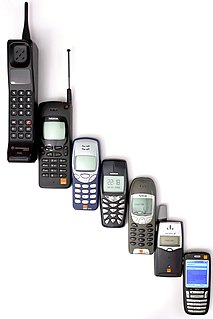
A mobile phone, cellular phone, cell phone, cellphone, handphone, or hand phone, sometimes shortened to simply mobile, cell or just phone, is a portable telephone that can make and receive calls over a radio frequency link while the user is moving within a telephone service area. The radio frequency link establishes a connection to the switching systems of a mobile phone operator, which provides access to the public switched telephone network (PSTN). Modern mobile telephone services use a cellular network architecture and, therefore, mobile telephones are called cellular telephones or cell phones in North America. In addition to telephony, digital mobile phones (2G) support a variety of other services, such as text messaging, MMS, email, Internet access, short-range wireless communications, business applications, video games and digital photography. Mobile phones offering only those capabilities are known as feature phones; mobile phones which offer greatly advanced computing capabilities are referred to as smartphones.
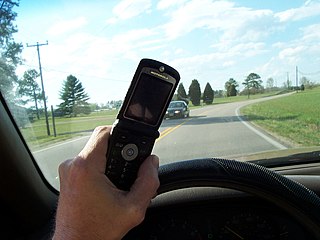
Texting while driving, also called texting and driving, is the act of composing, sending, reading text messages, email, or making similar use of the web on a Computer while operating a motor vehicle. Texting while driving is considered extremely dangerous by many people, including authorities, and in some places have either been outlawed or restricted. As a form of distracted driving, texting while driving significantly increases the chances that a driver will be involved in a motor vehicle accident.
Sexting is sending, receiving, or forwarding sexually explicit messages, photographs, or videos, primarily between mobile phones, of oneself to others. It may also include the use of a computer or any digital device. The term was first popularized early in the 21st century and is a portmanteau of sex and texting, where the latter is meant in the wide sense of sending a text possibly with images. In August 2012, the word sexting was listed for the first time in Merriam-Webster's Collegiate Dictionary.
Ambient awareness is a term used by social scientists to describe a new form of peripheral social awareness. This awareness is propagated from relatively constant contact with one's friends and colleagues via social networking platforms on the Internet. Some examples of social networking websites are Facebook, Myspace, Twitter, Blogger, etc. The term essentially defines the sort of omnipresent knowledge one experiences by being a regular user of these media outlets that allow a constant connection with one's social circle.

Distracted driving is the act of driving while engaging in other activities which distract the driver's attention away from the road. Distractions are shown to compromise the safety of the driver, passengers, pedestrians, and people in other vehicles.
Social Etiquette in real life is ingrained into our social life, although etiquette in technology, colloquially referred to as netiquette, is a fairly recent concept. It is a term used to refer to the unofficial code of policies that encourage good behavior on the Internet which is used to regulate respect and polite behavior on social media platforms, online chatting sites, web forums, and other online engagement websites. The rules of etiquette that apply when communicating over the Internet are different from those applied when communicating in person or by audio or videophone. It is a social code that is used in all places where one can interact with other human beings via the Internet, including text messaging, email, online games, Internet forums, chat rooms, and many more.

Problematic smartphone use is proposed by some researchers to be a form of psychological or behavioral dependence on cell phones, closely related to other forms of digital media overuse such as social media addiction or internet addiction disorder. Other researchers have stated that terminology relating to behavioral addictions in regards to smartphone use can cause additional problems both in research and stigmatization of users, suggesting the term to evolve to problematic smartphone use. Problematic use can include preoccupation with mobile communication, excessive money or time spent on mobile phones, and use of mobile phones in socially or physically inappropriate situations such as driving an automobile. Increased use can also lead to adverse effects on relationships, mental or physical health, and ensues anxiety if separated from a mobile phone or sufficient signal.

Thumb tribe or sometimes thumb generation is the younger generation with members who are more adept at texting using their thumbs than talking on the phone. The concept identifies a trend among young people who use mobile phones for many activities, such as texting, email, entertainment, and conversations, as opposed to using keyboards with traditional desktop computers, and marks a shift in the favorite digit such that activities typically done by the forefinger, such as pointing at things or ringing doorbells, are being done with the thumb. The term thumb tribe has been used by marketers to identify younger consumers and in politics to identify persons who are not part of the younger generation, such as American politician Mitt Romney, who may have a mobile phone but does not use it dexterously. According to researchers, this has led to the thumb being physically stronger and more flexible for many young people. There are medical implications as well; excessive use of thumbs can lead to muscle pain and possible occupational problems.










